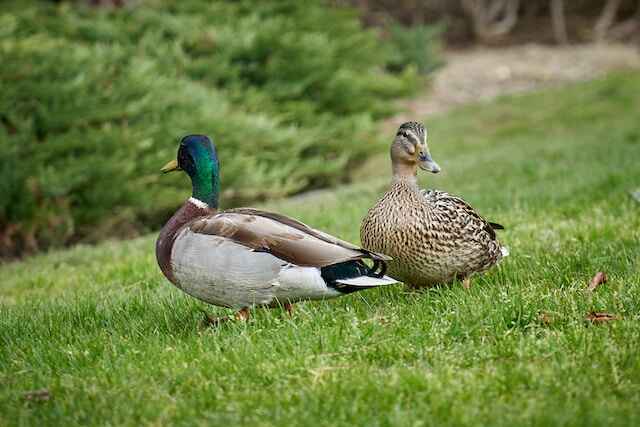Welcome to our comprehensive guide on the egg-laying habits of ducks! If you’ve ever wondered, “How Often Do Ducks Lay Eggs?” you’re in the right place. In this guide, we’ll cover everything you need to know about duck egg laying, from frequency to factors influencing egg production.
Table of Contents
A Brief Overview of Ducks and Their Egg-laying Habits
Ducks, members of the family Anatidae, are waterfowl that share lineage with geese and swans. They are known for their webbed feet, broad bills, and waterproof feathers that help them thrive in water environments.
However, ducks are also popular for their eggs, which have a unique taste and texture compared to chicken eggs. When it comes to egg-laying habits, ducks typically lay one egg per day during their breeding season.
The breeding season varies depending on the species of duck and geographic location. Some ducks may lay eggs year-round if conditions are favorable.
Duck eggs come in a variety of colors such as white, cream, blue-green, or even black. The color of the eggshell depends on the breed of duck; however, it has no impact on the nutritional value or taste of the egg.
Ducks are not as prolific at laying eggs as chickens; they lay fewer eggs but make up for it with larger-sized yolks compared to chicken eggs.
While domesticated ducks have been bred specifically for their egg-laying abilities, with production ranging from 200 to 300 eggs per year per bird (depending on breed), wild ducks tend to produce far fewer.
How often do ducks lay eggs?
Daily Egg Laying
Ducks are prolific egg-layers, and they typically lay one egg per day during their breeding season. This means that if you have a flock of ducks, you can expect to collect a lot of eggs each day.
The frequency of egg-laying varies depending on the species of duck and the geographic location where they live.
| Duck Breed | Daily Egg Laying |
|---|---|
| Campbell | 300 eggs per year |
| Runner | 250 eggs per year |
| Khaki Campbell | 300 eggs per year |
| Magpie | 260 eggs per year |
| Pekin | 200 eggs per year |
Breeding Season Variations
The breeding season of ducks varies depending on their location and species. For example, mallards in the Northern Hemisphere breed from March to July, while those in the Southern Hemisphere breed from August to December.
Some species of duck may only breed once a year, while others may have two or three breeding seasons per year.
| Duck Breed | Breeding Season |
|---|---|
| Mallard | Spring |
| Pekin | Year-round |
| Muscovy | Spring and early summer |
| Rouen | Spring and fall |
| Runner | Spring and fall |
Year-Round Laying
While most ducks will only lay eggs during their breeding season, some domesticated breeds such as Pekin and Muscovy ducks are known to produce eggs year-round if conditions are favorable.
These conditions include lighting that mimics longer daylight hours than usual (14-16 hours), which stimulates egg production in the birds.
| Duck Breed | Year-Round Laying |
|---|---|
| Indian Runner | Yes |
| Khaki Campbell | Yes |
| Ancona | Yes |
| Welsh Harlequin | Yes |
| Pekin | Yes |
Egg Production Decline
After a few years of laying eggs frequently, most female ducks will experience a decline in egg production. The decrease is due to genetics and age factors; older hens usually produce fewer eggs than younger ones.
How often do ducks lay eggs depends on various factors such as species, location and environmental factors like light exposure for domesticated breeds. However, it’s safe to say that most breeds will lay an egg per day during their breeding season.
This makes them great options for anyone interested in having fresh eggs all-year-round, as well as enjoying the benefits that come with consuming these unique delicacies!
| Age of Duck | Egg Production Decline |
|---|---|
| 2 years | Moderate decline |
| 3 years | Significant decline |
| 4 years | Steep decline |
| 5+ years | Low egg production |
Factors that affect duck egg-laying
Age of the duck: younger ducks may not lay as frequently as mature ducks
Just like humans, ducks also undergo different stages of life. Age is an important factor in egg-laying frequency.
Younger ducks may not lay eggs as frequently as mature ones. In general, ducks start laying eggs at around 5–7 months of age, when they reach sexual maturity.
However, it’s not uncommon for some breeds to start laying eggs earlier or later than this. As they age, their egg production tends to decrease.
| Age of the duck | Frequency of egg laying |
|---|---|
| 5-6 months | Fewer eggs per week |
| 7-9 months | Consistent laying |
| 1 year and older | Peak egg production |
Nutrition: a well-fed duck will produce more eggs than one with poor nutrition
Another important factor that affects the frequency of duck egg-laying is nutrition. A well-fed duck will produce more eggs than one with poor nutrition.
Ducks require a balanced diet rich in vitamins and minerals to lay healthy and regular eggs. If their diet is inadequate or imbalanced, their reproductive systems may suffer and result in decreased egg production.
Ducks are omnivores and require a diet that consists of grains, greens, insects and other proteins such as fish or meat scraps. Nutritional supplements such as oyster shells can also provide calcium needed for sturdy shells.
| Nutrition status | Egg production |
|---|---|
| Poor | Decreased |
| Adequate | Average |
| Optimal | Increased |
Daylight hours: longer daylight hours stimulate egg production in ducks
The amount of daylight hours in a day also plays a crucial role in determining the frequency of duck egg-laying. Ducks are photosensitive birds, which means they have the ability to detect changes in light levels around them through their eyes.
In general, longer daylight hours stimulate egg production, while shorter ones signal the end of breeding season or hibernation mode for some species.
In areas where there are extreme changes in daylight hours due to seasonal variations like winter months when days are shorter than nights, it’s common for farmers to provide artificial lights to supplement the natural daylight hours.
| Daylight hours | Egg production |
|---|---|
| 8-12 hours | Normal |
| 13-14 hours | Increased |
| >14 hours | Decreased |
Conclusion
There are several factors that come into play when it comes to the frequency of duck egg-laying, including age, nutrition, and daylight hours.
It’s important for duck owners and farmers to provide their birds with a balanced diet and adequate light exposure to ensure regular egg-laying.
With proper care and attention, ducks can lay eggs frequently throughout their breeding season.
Types of Duck Eggs
Domesticated Duck Eggs
If you’ve ever visited a grocery store, you may have seen cartons of duck eggs sitting next to the chicken eggs. These eggs are from domesticated ducks, which are raised specifically for their eggs or meat.
Domesticated duck eggs are larger than chicken eggs and have a slightly richer taste due to their higher fat content. In the culinary world, duck eggs are highly prized for their unique flavor and texture.
They can be used in a variety of dishes, from omelets to cakes. Bakers often use duck eggs in their recipes because they have a higher protein content than chicken eggs, which makes them ideal for creating light and fluffy baked goods.
Wild Duck Eggs
While domesticated duck eggs are common in grocery stores, wild duck eggs are a rarity because they are illegal to harvest in many areas.
Wild ducks lay their eggs in nests that can be difficult to find, so harvesting them is often illegal to protect the populations of wild ducks.
However, some people still consume wild duck eggs despite the legal consequences. These people argue that eating wild duck egg is a traditional delicacy that has been enjoyed for centuries.
It’s important to note that consuming wild duck egg comes with some risks. Wild ducks can carry diseases like avian influenza or salmonella, which can be transmitted through their eggshells or yolks if not cooked properly.
While both domesticated and wild duck eggs have unique qualities and flavors that make them desirable for consumption or culinary purposes, it’s essential to consider safety measures when consuming any type of food product.
Interesting Facts About Duck Eggs
The Richer Flavor of Duck Eggs
Duck eggs are known for their unique flavor, which is richer and stronger than that of chicken eggs. This is because duck egg yolks have a higher fat content than chicken egg yolks.
The higher fat content gives them a creamy, buttery taste that is perfect for savory dishes like quiches or omelets. Additionally, the richer flavor of duck eggs makes them ideal for baking moist cakes and pastries.
| Aspect | Description |
|---|---|
| Taste | Rich and flavorful |
| Texture | Creamier and silkier |
| Color | Yolk is darker and more vibrant |
| Aroma | Stronger and distinct |
The Thick Shells of Duck Eggs
Another interesting fact about duck eggs is that their shells are thicker than those of chicken eggs. This thickness can be attributed to the fact that ducks lay their eggs in wetlands, where predators are a constant threat.
As a result, they need strong shells to protect their precious contents from being crushed or cracked. The thicker shells also give duck eggs a longer shelf life, making them easier to transport and store.
| Aspect | Description |
|---|---|
| Shell thickness | Thicker than chicken eggs |
| Shell strength | Sturdier and harder to crack |
| Porosity | Lower porosity rate than chicken eggs |
| Protection | Better protection against bacterial infection |
The Larger Yolk-to-White Ratio in Duck Egg Yolks
When you crack open a duck egg, you will notice that the yolk is much larger than the white compared to chicken eggs. This is because ducks are larger birds and require more nutrients to develop properly.
As a result, they produce larger yolks with more vitamins and minerals compared to chicken egg yolks. The larger yolk-to-white ratio in duck egg yolks also makes them ideal for custards or other dishes where an extra-rich texture is desired.
| Aspect | Description |
|---|---|
| Yolk-to-white ratio | Higher yolk-to-white ratio than chicken eggs |
| Yolk size | Larger and more flavorful yolk |
| Nutrient density | Higher nutrient density in yolk |
| Cooking | Yolk is creamier and great for baking |
Duck Egg Nutrition
In addition to having more vitamins and minerals than chicken eggs, duck eggs also contain more protein per serving. A single large duck egg contains around 9 grams of protein, compared to the 6 grams in a large chicken egg.
Furthermore, studies have shown that the cholesterol levels in duck eggs are not significantly higher than those in chicken eggs, despite popular belief.
This means that duck eggs can be a healthier and more flavorful alternative to chicken eggs. Duck eggs are a fascinating and delicious food item that offer many benefits over their more common chicken egg counterparts.
From their richer flavor to their thicker shells and larger yolks, duck eggs are a versatile ingredient for cooking and baking.
Whether you’re looking for a healthier alternative to chicken eggs or simply want to try something new, adding duck eggs to your diet is definitely worth considering.
| Nutrient | Amount per 100g |
|---|---|
| Calories | 185 kcal |
| Protein | 12.81 g |
| Fat | 13.77 g |
| Carbohydrates | 1.45 g |
| Cholesterol | 884 mg |
| Vitamin A | 1274 IU |
| Vitamin D | 47 IU |
| Calcium | 64 mg |
| Iron | 3.27 mg |
| Potassium | 206 mg |
Conclusion
Ducks are fascinating animals with a unique egg-laying process. Throughout this article, we have learned that ducks can lay eggs once a day during their breeding season, which varies depending on the species of duck and geographic location.
However, some ducks may lay eggs year-round if conditions are favorable. There are several factors that affect duck egg-laying, such as the age of the duck, nutrition, and daylight hours.
It is important to provide adequate nutrition for ducks to ensure they produce healthy and abundant eggs. There are also different types of duck eggs available, including domesticated and wild duck eggs.
Domesticated duck eggs are commonly sold in grocery stores and used for cooking and baking. Wild duck eggs are illegal to harvest in many areas, but some people still consume them for their unique taste.
One interesting fact about duck eggs is that they have a higher fat content than chicken eggs, which makes them richer in flavor.
The shells of duck eggs are also thicker than chicken egg shells, making them stronger and more durable. Additionally, the yolks of duck eggs are larger and have a higher yolk-to-white ratio compared to chicken egg yolks.
Overall, learning about how often ducks lay eggs can be helpful for those who raise them or those who simply enjoy eating their deliciously rich-tasting eggs.
With proper care and attention given to these wonderful creatures, they can continue to provide us with an abundance of fresh and nutritious food.





